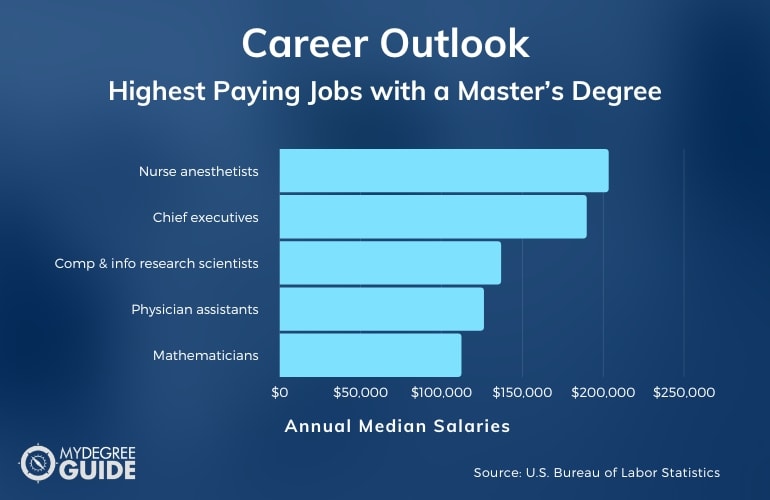In today’s rapidly evolving job market, there’s a diverse range of careers that require a master’s degree.

In this comprehensive guide, we will examine the potential benefits of a masters degree and explore a number of professions that require advanced education and expertise.
Editorial Listing ShortCode:
Top careers with a masters degree range from cutting-edge tech roles to leadership positions in healthcare, offering both personal development and higher earning potential.
Careers That Require a Master’s Degree

Earning a masters degree is an advanced educational pursuit with potential career benefits. While it doesn’t guarantee job outcomes or specific salaries, a graduate degree can typically help you grow your qualifications and earning potential.
Master’s programs enable you to deepen your expertise and specialize in specific fields. A masters could help you stand out to employers who are seeking advanced qualifications. In many professions, master’s degrees are either necessary or preferred for higher-level positions.
Certain fields, such as healthcare and education, often mandate master’s degrees for specialized roles, like nurse practitioners or school counselors. A masters degree could also open doors to career growth and leadership roles by helping you develop critical thinking, research, and problem-solving skills applicable across industries.
Overall, some of the most useful masters degrees are ones that align with your career field and help you qualify for your preferred position.
15 Jobs That Require a Master’s Degree
What jobs can you get with a master’s degree? In today’s competitive job market, a master’s degree has become a beneficial asset, opening doors to a wide array of dynamic and rewarding careers.
In this section, we will explore 15 professions that typically require a masters degree as a minimum education requirement. All salary data is from the Bureau of Labor Statistics.
1. Computer and Information Research Scientist

Annual Median Salary: $136,620
Computer and information research scientists are highly skilled professionals who drive technological advancements. They research, design, and develop cutting-edge computing systems, software, and algorithms.
A master’s degree is often required for this role, and they tackle complex challenges in fields like artificial intelligence and data analysis. These scientists play a pivotal role in shaping the future of technology, making it a rewarding career with promising earning potential.
2. Criminologist

Annual Median Salary: $98,590
Criminologists are experts who investigate the causes and effects of criminal behavior. They analyze crime data, conduct research, and develop strategies for crime prevention and criminal justice reform.
Positions in criminology typically require a masters degree, and it can be a rewarding field for those passionate about understanding and addressing crime-related issues. Your work could potentially contribute to safer communities and more effective law enforcement practices.
3. Curator

Annual Median Salary: $60,380
Curators are professionals responsible for preserving and managing collections of art, historical artifacts, or other valuable items in museums, galleries, and cultural institutions. They may curate exhibitions, conduct research, acquire new pieces, and oversee the conservation and presentation of collections.
Curators are often required to hold a masters, and they play a vital role in safeguarding our cultural heritage and offering educational opportunities to the public.
4. Economist

Annual Median Salary: $113,940
Economists are professionals who analyze economic data and trends to provide insights into financial and policy decisions. They may conduct research, develop models, and offer recommendations to governments, businesses, or organizations.
A masters degree is often essential for entry into this field. Economists play a crucial role in shaping economic policies, forecasting market trends, and contributing to informed financial strategies.
5. Education Administrator

Annual Median Salary: $99,940
Education administrators are professionals who manage educational institutions, such as schools, colleges, and universities. They oversee day-to-day operations, support faculty and staff, set policies, improve academic programs, and ensure compliance with regulations.
This role typically requires a master’s degree. Education administrators play a pivotal role in shaping the quality of education. In this career, you may have the opportunity to create a positive impact on students’ learning experiences and the overall educational system.
6. Epidemiologist

Annual Median Salary: $78,520
Epidemiologists are experts in public health who investigate patterns and causes of diseases. They can collect and analyze data, track outbreaks, and develop strategies for disease prevention and control. Typically, a master’s degree is required for this profession.
Epidemiologists play a critical role in safeguarding public health, informing healthcare policies, and contributing to the understanding and mitigation of health threats.
7. Genetic Counselor

Annual Median Salary: $89,990
Genetic counselors are healthcare professionals who provide guidance and support to individuals and families dealing with genetic conditions and risks. They often assess family histories, order genetic tests, interpret results, and offer information and counseling regarding inherited conditions.
Genetic counselors can help individuals make informed decisions about their genetic health, reproductive choices, and medical management. This position typically requires a master’s degree and can contribute to improved patient care and well-being.
8. Marriage and Family Therapist

Annual Median Salary: $56,570
Marriage and family therapists are trained professionals who specialize in helping individuals, couples, and families navigate emotional and relationship challenges.
Licensed MFTs can conduct therapy sessions, assess mental health, and develop treatment plans to address issues like marital conflicts, addiction, or emotional distress. A master’s degree is required for marriage and family therapist licensure. In this role, you could help promote mental well-being and healthier relationships and contribute to stronger families and communities.
9. Nurse Practitioner

Annual Median Salary: $121,610
Nurse practitioners are advanced practice registered nurses who hold a master’s degree as a standard requirement. They provide comprehensive healthcare services, including diagnosing and treating illnesses, prescribing medications, and offering preventive care.
Nurse practitioners often specialize in areas like pediatrics, family medicine, or gerontology. NPs are essential contributors to the healthcare system, as they work to improve healthcare access and ensure patients receive high-quality medical care.
10. Occupational Therapist

Annual Median Salary: $93,180
Occupational therapists are healthcare professionals who help individuals with physical, emotional, or developmental challenges regain independence in their daily lives. Licensed OTs are often required to have a masters degree.
OTs assess patients’ abilities, develop personalized therapy plans, and provide interventions to help patients improve fine motor skills and adapt to disabilities. In this role, you might have the chance to work in diverse settings, such as hospitals, schools, and rehabilitation centers.
11. Orthotist and Prosthetist

Annual Median Salary: $77,070
Orthotists and prosthetists are healthcare professionals who specialize in designing, fitting, and providing orthotic and prosthetic devices to improve patients’ mobility and functionality. A master’s degree is a common requirement for these roles.
They assess patients’ needs, create custom devices like braces or artificial limbs, and ensure proper fit and functionality. As an orthotist or prosthetist, you could help people with physical disabilities restore their independence and mobility.
12. Physician Assistant

Annual Median Salary: $126,010
Physician assistants are advanced healthcare professionals, and a specialized master’s degree is a standard requirement. They work under the supervision of physicians to provide medical care, including diagnosing illnesses, prescribing medications, and treating patients. They can work in various healthcare settings, ranging from hospitals to primary care clinics.
As a physician assistant, you could help enhance patient access to medical services and the overall effectiveness of the healthcare system.
13. Political Scientist

Annual Median Salary: $128,020
Political scientists are often required to hold a masters degree, and these experts study political systems, policies, and behaviors. They tend to conduct research, analyze data, and offer insights into political trends and issues.
Their work can help inform government decisions, aid in policy development, and provide a deeper understanding of political processes.
14. School Counselor

Annual Median Salary: $60,140
Licensed or certified school counselors are typically required to hold a master’s degree. These dedicated professionals work in educational settings to support students’ academic, social, and emotional development.
They may provide guidance on academic planning, address personal challenges, and assist in college and career readiness.
15. Speech-Language Pathologist

Annual Median Salary: $84,140
Speech-language pathologists are healthcare professionals who assess, diagnose, and treat communication and swallowing disorders. A masters is typically required for state licensure. These professionals can work with individuals of all ages, from children with speech delays to adults recovering from stroke.
Speech-language pathologists can develop personalized therapy plans and help patients improve their communication skills and swallowing function.
What Are Some of the Highest Paying Jobs with a Master’s Degree I Can Get?

While obtaining a master’s degree doesn’t guarantee a particular career or salary, it can enhance your qualifications for high-paying roles.
According to the Bureau of Labor of Statistics, here are the median annual salaries of some well-paying jobs that require a master’s degree:
- Nurse anesthetists — $203,090
- Chief executives — $189,520
- Computer and information research scientists — $136,620
- Physician assistants — $126,010
- Mathematicians — $112,110
These professions with masters degrees that pay well often offer competitive salaries, but individual outcomes will vary depending on factors like experience, employer, and location. If you’re thinking about advancing your education, you can explore one year masters programs for medical school from accredited universities.
Is a Master’s Degree Worth It?

Yes, a master’s degree is worth it for many students. According to the Bureau of Labor Statistics, many master’s degree careers are experiencing faster than average job growth. As such, there is an increasing demand for professionals with advanced education in a variety of fields.
A master’s degree can generally help enhance your job prospects, open doors to leadership roles, and provide specialized knowledge and skills that are highly valued by employers. Ultimately, the decision of whether to pursue a graduate degree will likely depend on your field and your career goals. A number of accredited universities now offer accelerated programs like one year masters programs.
Getting Your Masters Degree Online

An online master’s degree can be a game-changer for many, providing the skills and expertise needed to thrive in high-demand fields.
Whether you aspire to make an impact in healthcare, technology, or business, pursuing a masters degree could help open doors to rewarding masters degree jobs. The decision to pursue advanced education is a personal one, often dependent on your field and whether your preferred career requires or could benefit from a graduate degree.
Are online masters degrees respected? Ensuring that a program is accredited and affiliated with reputable institutions is crucial, as it assures quality education and wider professional recognition.
If grad school could help you work toward your professional goals, you can start exploring accredited colleges and universities today to find the online masters program that’s right for you.
